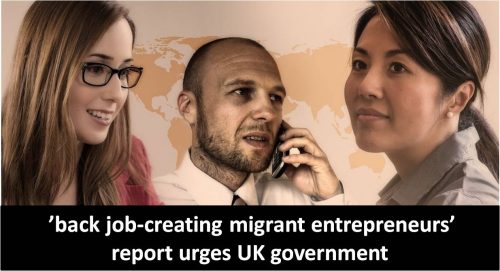A report launched recently in parliament says the UK needs to back migrant entrepreneurs to help Brexit succeed. It says the businesses they create generate jobs and boost the economy.
Information for the report “Migrant Entrepreneurship in the UK: Celebrating the benefits to Britain,” came from interviews and surveys with members of the Institute of Directors (IoD), including migrant entrepreneurs.
It suggests that when they come to Britain, migrant entrepreneurs face particular challenges, such as qualifications not recognized in the UK, lack of support networks, or difficulty accessing finance.
 Migrant entrepreneurs create jobs and boost the UK economy says a new report that urges the government to ensure they continue to receive a welcome in the wake of Brexit.
Migrant entrepreneurs create jobs and boost the UK economy says a new report that urges the government to ensure they continue to receive a welcome in the wake of Brexit.
Overcoming these barriers would help migrant-led business create even more jobs and further boost the UK economy. So say the report authors, Rafael dos Santos, a Brazilian-born entrepreneur and founder of a London-based co-working space specifically for migrant entrepreneurs called mi-HUB, and Andy Silvester, IoD’s Head of Campaigns.
They found that the majority of the migrant entrepreneurs interviewed for the report, many of whom are now leading companies in the UK, either employ native-born workers or plan to do so.
Before setting out to start their own firms, many of them came to these shores to study or work for established companies.
Barriers for migrant entrepreneurs
The report follows another published earlier this year by the GEM Consortium that found immigrants are three times more likely to launch new companies than lifelong UK residents.
According to the Centre for Entrepreneurs, nearly half a million people from 155 countries have settled in the UK and started businesses.
In a 2014 report they compiled with business information company DueDil, the think tank said the contribution of foreign-owned companies to Britain was “striking,” as they revealed one in every seven companies in the UK are set up by migrant entrepreneurs.
With results that echo these earlier findings, the new IoD report warns that if the Brexit process results in restrictions or complications to the visa system, it would cause long-term damage to the UK economy.
Using information from interviews with 80 such individuals, the IoD report discusses the challenges migrant entrepreneurs face when they start up enterprises in the UK. For example:
– nearly half (44 percent) said lack of networks and contacts holds them back
– a third said there is a lack of knowledge about schemes to help start-ups
– a third said access to finance is difficult
Those who said accessing finance was a big problem mentioned that a particular difficulty is transferring credit history to the UK – especially from outside the European Union. This means, for example, that it is a struggle to get credit cards to fund the early phase of a start-up.
UK must remain open for migrant entrepreneurs
Simon Walker, Director General of the IoD, says: “For all the talk of migrants ‘taking our jobs,’ it’s more likely that they will be creating them.”
He says as the government proceeds to rewrite Britain’s post-Brexit immigration policy, it should “we are still open to those who want to grow their businesses in the UK.”
 Lack of a contact network is one of several challenges that migrant entrepreneurs face when they are starting up in business.
Lack of a contact network is one of several challenges that migrant entrepreneurs face when they are starting up in business.
Lord Young of Graffham, former Secretary of State for Trade and Industry, explains in the report’s Foreword that his father was an immigrant when he arrived in London in 1905 at the age of 5 with his parents – they were fleeing Lithuania.
He says, “by and large it is the most entrepreneurial people who get up and go when living at home becomes impossible and they bring their entrepreneurialism with them.”
“But entrepreneurialism by itself is not enough,” says Lord Young, who wrote the government’s Report on Small Firms: 2010-2015. He explains:
“If you want to start your own business you need a stable environment, sensible taxation, and reasonable regulation within the rule of law, the three basic requirements for all business and those we provide better than anywhere else in Europe.”
Meanwhile, in the United States, the Obama administration recently proposed a rule aimed at attracting thousands of migrant entrepreneurs to start companies there.
Video – Rafael dos Santos talks to London Live
In the following video, London Live interviews dos Santos about the report and ask him about migrant entrepreneurs in Britain.
